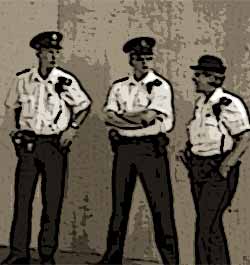Police
Misconduct
Police misconduct happens more often than
some people think and less often than other people think. It's
a matter of perspective in how often people believe police misconduct
occurs.
If you happen to be a young black male,
your answer to how often police misconduct happens may differ
significantly from the answer of that of an elderly white female.
Perspective aside, what matters most is that police misconduct
does occur. There is no doubt that members of law enforcement,
in general, undergo more stress than the normal citizen on a daily
basis. It is also widely accepted that the vast majority of police
officers and other law enforcement officials routinely do their
jobs capably and without incident.
This is no small feat since law enforcement officers face the
public and are under pressure to make arrests, reduce crime and
keep the public safe while balancing the rights of the public,
officer safety and their own well-being. Many officers will have
to make split-second decisions involving potential injury to themselves,
their fellow officers and the public. This kind of ongoing pressure
will mean that a small percentage of officers will err, make poor
decisions or engage in misconduct.
For those who do not think police misconduct is real or at least
a substantial issue in today's society, one only need to be reminded
of the LAPD anti-gang CRASH unit in 2000 that was involved in
a wide-ranging police misconduct scandal in which over 20 officers
were fired. Because of this police misconduct scandal, over 40
court cases were overturned.
In addition, in 2000 on the other coast in New York City, who
can forget the police misconduct case of Amadou Diallo, a muslim
computer science student who was shot to death by four police
officers in the Bronx in a case of mistaken identity. The Diallo
family received a $3 million wrongful
death settlement from the City of New York, one of the highest
ever for a single man with no dependents. And in 1991, in Los
Angeles, the Rodney King beating by police officers was caught
on tape starting a massive riot in the streets leading to 50 deaths
and 8,000 arrests. King eventually received $3.8 million in a
civil suit against the LAPD. Because of this episode the October
22nd Coalition to Stop Police Brutality organization was founded.
In the last couple of years, the kinds of police misconduct cases
that have been reported have not been as high-profile as the aforementioned
cases. Nonetheless, many episodes of police misconduct are reported
every week, nationwide, that don't make the media radar. Police
misconduct websites have sprung up detailing the ongoing reports
of police misconduct throughout the nation.
According to the United States Department of Justice (DOJ), which
investigates police misconduct cases at a federal level, many
laws are in place so that an individual may bring action in the
civil courts. According to Title VI of the Civil Rights Act of
1964 and the "OJP Program Statute," some of the common
reasons cited in police misconduct cases include discriminatory
misconduct, harassment, racial slurs, false arrest, discriminatory
traffic stops, excessive force, coercive sexual behavior, retaliation
for filing a complaint, retaliation for participation in an investigation
or refusal of an agency to respond to complaints about misconduct.
The DOJ has additional powers beyond that of the normal citizen
to pursue police misconduct cases and file both criminal and civil
charges against both officers and law enforcement organizations.
In many jurisdictions, individuals may also bring charges for
police misconduct that include behavior that results in the loss
of property, loss of freedom, unlawful searches and social stigmatization.
A person may have been deprived of his or her Constitutional Rights
such as those outlined in the1st, 4th, 6th, 8th, 14th Amendments.
In addition, a person's right to religious freedom or rights under
the Disabilities Act may have been violated. It is important to
check with a personal injury lawyer
in your jurisdiction to find out which types of police misconduct
are actionable by individuals and which must be initiated by the
DOJ or other government body.
Police misconduct charges are not limited to being filed against
police officers but may also be filed against those acting under
the "color of law". The color of law simply means any
person using the power of law given to them by their local, state
or federal government agency. For instance, correctional facility
officers may be acting under the color of law but an off-duty
police officer may not be acting in an official capacity at the
time of the incident.
Police misconduct cases can be very complex and it is important
to check with a personal injury attorney in regards to the specifics
of your case, so that you have a full understanding of your rights
and options under the laws in your state and locality.
|


